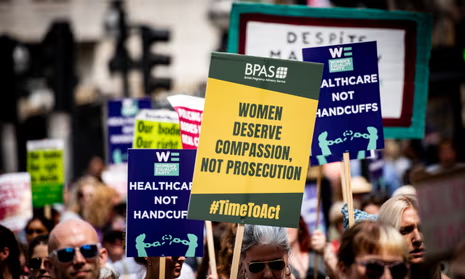Women in England and Wales may soon be protected from prosecution for ending their own pregnancies, under a landmark proposal to decriminalise abortion that will go before Parliament next week.
MPs are set to participate in a free vote — meaning they can vote according to their conscience rather than following party lines — on a key amendment to the Crime and Policing Bill. The change would remove the threat of police investigations and possible imprisonment for women who terminate pregnancies outside the strict boundaries of current law.
The debate has been reignited amid concern that more women are facing criminal charges for ending pregnancies illegally. In recent years, at least six women have appeared in court in England on such charges, raising fears about the fairness and relevance of abortion laws originally passed in the 19th century.
Abortion in England and Wales remains governed by the Offences Against the Person Act of 1861, which criminalises the procedure. However, under the 1967 Abortion Act, abortions are permitted up to 24 weeks in certain circumstances, provided that two doctors approve the procedure. Even in early stages of pregnancy, women must demonstrate that continuing the pregnancy would harm their mental or physical health.
The proposed amendment, brought forward by Labour MP Tonia Antoniazzi, seeks to decriminalise abortion at any stage if a woman is acting in relation to her own pregnancy. The existing framework for accessing abortions through healthcare settings would remain intact: procedures performed in hospitals or clinics would still require approval from two doctors and must comply with existing time limits.
“The police cannot be trusted with abortion law – nor can the CPS or the wider criminal justice system,” Antoniazzi stated. “My amendment will give us the urgent change we need to protect women.”
Her proposal comes just weeks after Nicola Packer, a 45-year-old woman, was acquitted by a jury after being prosecuted for taking abortion pills at home during the COVID-19 lockdown in 2020. Packer was unaware that her pregnancy had exceeded the legal limit for home-administered abortion medication. Her case drew widespread criticism of current abortion laws, which many experts now describe as outdated and harmful.
The Royal College of Obstetricians and Gynaecologists (RCOG) has joined a growing coalition of medical bodies, charities, and trade unions supporting Antoniazzi’s amendment. The proposal has already gained the backing of 136 MPs from across party lines, including Labour, Liberal Democrats, Greens, and a number of Conservatives.
However, a rival amendment by Labour MP Stella Creasy seeks to go even further, by establishing access to abortion as a human right and fully decriminalising abortions up to 24 weeks. Creasy’s proposal, backed by 101 MPs, would also remove potential prison sentences for late-term abortions outside the current legal framework.
Read Also: Ondo: Doctor, two others remanded to prison for procuring abortion, raping minor
Creasy argues that her amendment would align abortion laws in England and Wales with those in Northern Ireland, where abortion was decriminalised in 2019. But some leading abortion care providers have voiced concerns about the proposal being rushed through Parliament without sufficient scrutiny.
“MPs should not be asked to back a generational change after just three hours of debate,” said Rachael Clarke, head of advocacy at the British Pregnancy Advisory Service (BPAS), which supports Antoniazzi’s more measured amendment. The bill is expected to be opposed by pro-life groups and other Christian organisations.
With public attention focused on the issue, next week’s vote could mark a historic moment for women’s reproductive rights in England and Wales, shaping the legal and moral landscape for years to come.



